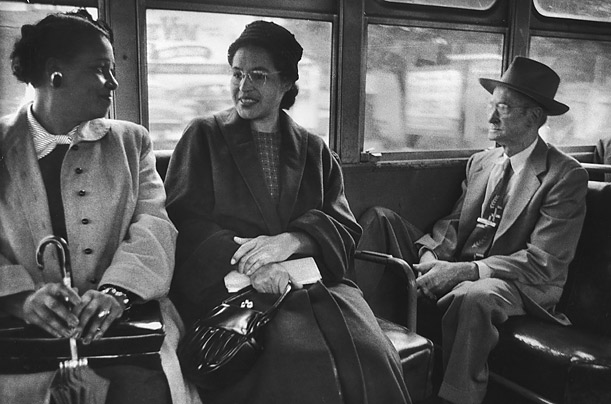
"Book Review - Rosa Parks by Douglas Brinkley," reviewed by Grace Lee Boggs on 30 June 2001, in Yes! Magazine: Rosa Parks has become a symbol of courage for our time and for all time. All over the world, she ranks with Nelson Mandela and Dr. Martin Luther King, Jr., in the pantheon of 20th-century heroes and sheroes who have expanded our notion of what it means to be a human being.

But in becoming an icon, Parks has been turned into a shadow of her real self. Few people are aware of her lifetime of struggle before and after that fateful day in 1955, when her refusal to give up her seat on an Alabama bus triggered the 13-month-long boycott that launched the modern civil rights movement.

How many people know that, unlike Gandhi and King, she refused to rule out the righteous use of force? Not only did she admire Malcolm X, she flew down to Monroe, North Carolina, just a few years ago for the funeral of Robert Williams, the outspoken advocate of armed self- defense by the black community.

One of the main virtues of this book is that it demolishes the myth that Rosa Parks was just a good-hearted, middle-aged seamstress who was simply too tired from working all day to give up her seat. Historian Douglas Brinkley, also the author of award-winning biographies of Jimmy Carter and Franklin D. Roosevelt, reveals the difficult decisions that educated Parks politically and empowered her not only to say “no” on December 1, 1955, but to give permission for her “no” to become the basis for a constitutional challenge to Montgomery's bus segregation ordinance.

Brinkley writes, “While the NAACP executives made dinner speeches and attended national conferences,” Parks, as the local NAACP secretary, “balanced the ledgers, kept the books, and recorded every report of racial discrimination that crossed her desk. She also did field research, traveling from towns like Union Springs to cities like Selma to interview African Americans with legal complaints, including some who had witnessed the murders of blacks by whites in rural areas.”

As the mother of the Civil Rights movement, Rosa Parks received countless awards, including the Congressional Gold Medal. But most people see only the fame and not the enormous risks she took. In 1957, for example, the family was forced to leave Montgomery and move to Detroit, because continuing death threats were driving her husband to “near-suicidal despair,” and also because Rosa's celebrity status had made the couple unemployable by Montgomery's white business community.

Another too-often ignored reason for the Parks leaving Montgomery was jealousy. Black men, especially black preachers, were not used to sharing the spotlight with women. So out of envy, male colleagues like E.D. Nixon and the Reverend Ralph Abernathy began making Rosa's life miserable by belittling her and her husband. But it wasn't only the men. The female plaintiffs in a concurrent antisegregation lawsuit were “angry that everybody was saying ‘Rosa this' and ‘Rosa that.'” They felt they deserved the public adulation, the NAACP-sponsored trips to New York, the invitations to speak, and the praise from Dr. King as much as she did.

“We all have a lot to learn from the incredible journey of this quiet, self-effacing radical activist,” Brinkley writes. “Let us not freeze her into a single day or a single moment.” (source: Yes! Magazine)

No comments:
Post a Comment